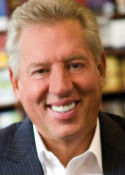I used to think that leaders distinguished themselves by rising above their people. It’s the “cream of the crop” theory. That was a mistake. I’ve learned that leaders distinguish themselves by rising with their people, and there’s a world of difference between those two.
Leaders take people with them on the journey. You don’t go by yourself. If you’re going by yourself, you are not a leader. You might be a very self-made, successful person, but you’re not a leader. You’ve got to decide whether you’re going to be a tour guide or a travel agent.
Travel agents give you brochures and tell you all about the trip, but they’ve never even been there. They get the tickets for you, give you a planner and send you off somewhere.
You don’t want to be a travel agent; you don’t want to be sending people where you’ve never been – you want to be a tour guide. You want to bring your people along with you and say, “Let me show you something. I’m going to take you places where I’ve been and lived, and tell you all about them as we go. I’m going to let you in on the journey.”
Because I felt that leaders should be separated from others in my younger days, because I mistakenly felt that leaders should rise above their people the following things happened:
- I was lonely
We’ve all heard the expression “It’s lonely at the top,” haven’t we? Well, I was at the top, lonely. By the way, a leader never said that – you know that, don’t you? Because if you’re at the top all alone, nobody’s following you! I’d get off the mountain if I were you. I’d go find the people. - I seldom asked for help
The reason I seldom asked for help is because I thought it was a sign of weakness. I thought that leaders had to be Mr. Answer Man or Ms. Answer Woman. Why would you ask somebody for help? After all, that would make you kind of like them, and after a while, you could be a commoner if you weren’t careful. Sooner or later, everyone needs help, and admitting it does not make you less of a leader. - I was very position-conscious
I was very position-conscious. I was making sure that I had my title and my position and “my rights.” Let me tell you something: leaders come from all walks of life, and they often lead people without the benefit of a position or a title. They do it by building influence with others. People who are focused on their position are too wrapped up rights and responsibilities to influence anyone. - I was very competitive
I became very competitive during that whole process, and the reason for that’s very simple: I was always trying to beat someone else. People are not apt to follow you if your goal is to defeat them and make a loser out of them. Leaders encourage people and make them feel like winners.
This was one of many mistakes I made in my early years, and I will discuss others I made during those times in upcoming issues of Leadership Wired.
free monthly e-newsletter: Leadership Wired
available at www.INJOY.com.
John Maxwell grew up in the 1950s in the small Midwestern city of Circleville, Ohio. John's earliest childhood memory is of knowing that he would someday be a pastor. He professed faith in Christ at the age of three, and reaffirmed that commitment when he was 13. At age 17, John began preparing for the ministry. He attended Circleville Bible College, earning his bachelor's degree in 1969. In June of that same year, he married his sweetheart, Margaret, and moved to tiny Hillham, Indiana, where he began his first pastorate.
While serving in his second church, Maxwell began to study the correlation between leadership effectiveness and ministry effectiveness. On July 4, 1976, while preaching at a service commemorating America's bicentennial, John sensed that God was calling him into a ministry to pastors. Within days after that event, pastors began to contact him, asking for his assistance in nurturing their churches. Over the next four years, on an informal basis, John helped scores of fellow pastors. Then, in 1980, he was asked to become Executive Director of Evangelism for the Wesleyan denomination.
Though his time at Wesleyan headquarters was productive, John soon realized that his deeper desire was to help pastors from numerous denominations. He knew that desire would be unfulfilled if he were to stay at denominational headquarters. As a result, in 1981 John accepted the call to return to the pastorate, this time at Skyline Wesleyan Church in the San Diego, California area. But he did so with the church's blessing to pursue his vision. The Skyline congregation allowed him to continue mentoring and assisting pastors even as he led them to new levels.
In 1985, as he continued to equip and encourage other pastors, John took the next crucial step in leadership development. He founded a new company called INJOY and created the INJOY Life Club, featuring a monthly tape for leaders. The fledging operation, established in the corner of a garage, was soon bursting at the seams. The INJOY Life Club tapes were received with great enthusiasm, and the number of subscriptions quickly increased from hundreds to thousands. Simultaneously, the demand for other resources and seminars exploded. Pastors from coast to coast were responding, and their desire for help was even greater than John had anticipated.
As the years passed, INJOY began demanding more and more of John's time. In 1995, he resigned from his position as senior pastor at Skyline following a very fruitful 14-year tenure. The church had tripled in size and its lay ministry involvement had increased ten-fold. Dr. Maxwell is in great demand today as a speaker. Through his bestselling books, audio and video resources, and major conferences, he communicates directly with more than one million people every year. He is frequently asked to speak for organizations such as Promise Keepers and Focus on the Family, but his greatest joy and desire is to help pastors become better leaders.
Because the need for leadership development knows no borders, John established EQUIP, a non-profit organization which trains leaders in urban communities, academic institutions, and within international organizations. EQUIP is also spearheading a movement which has enlisted more than one million pastoral prayer partners who covenant to pray specifically for those who shepherd God's flock.
John continues to seek new opportunities to help churches and church leaders. He knows that one thing is constant: the only hope for the world is salvation through the Lord Jesus Christ, who gives life abundantly.




